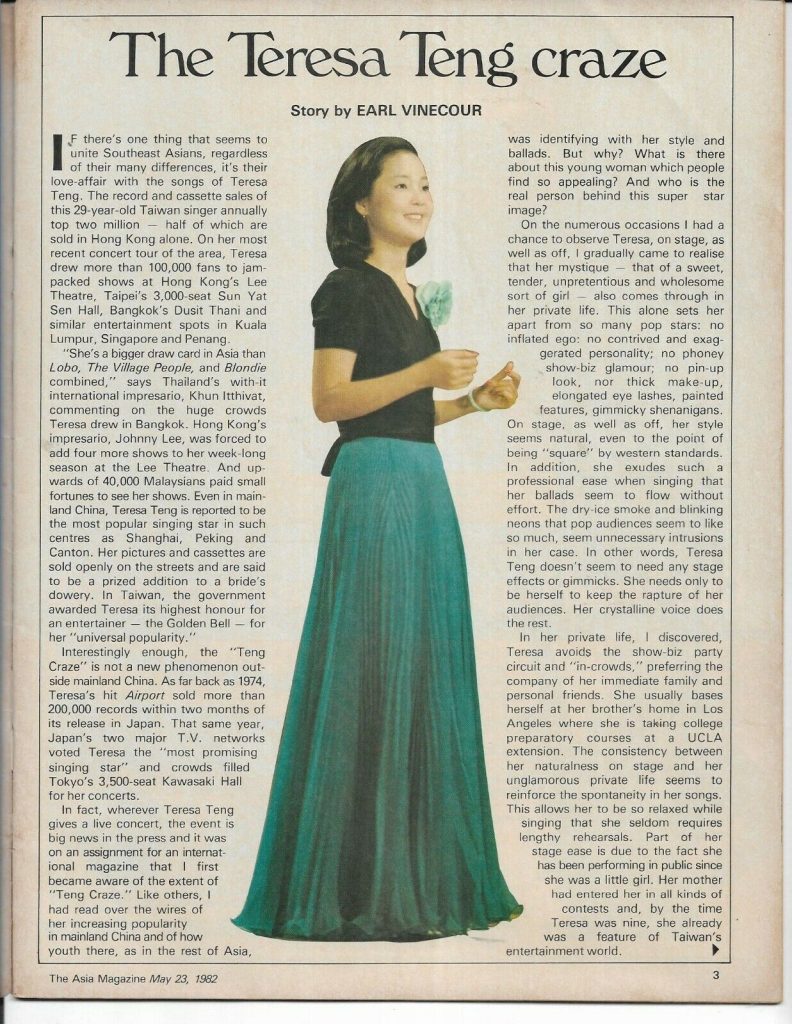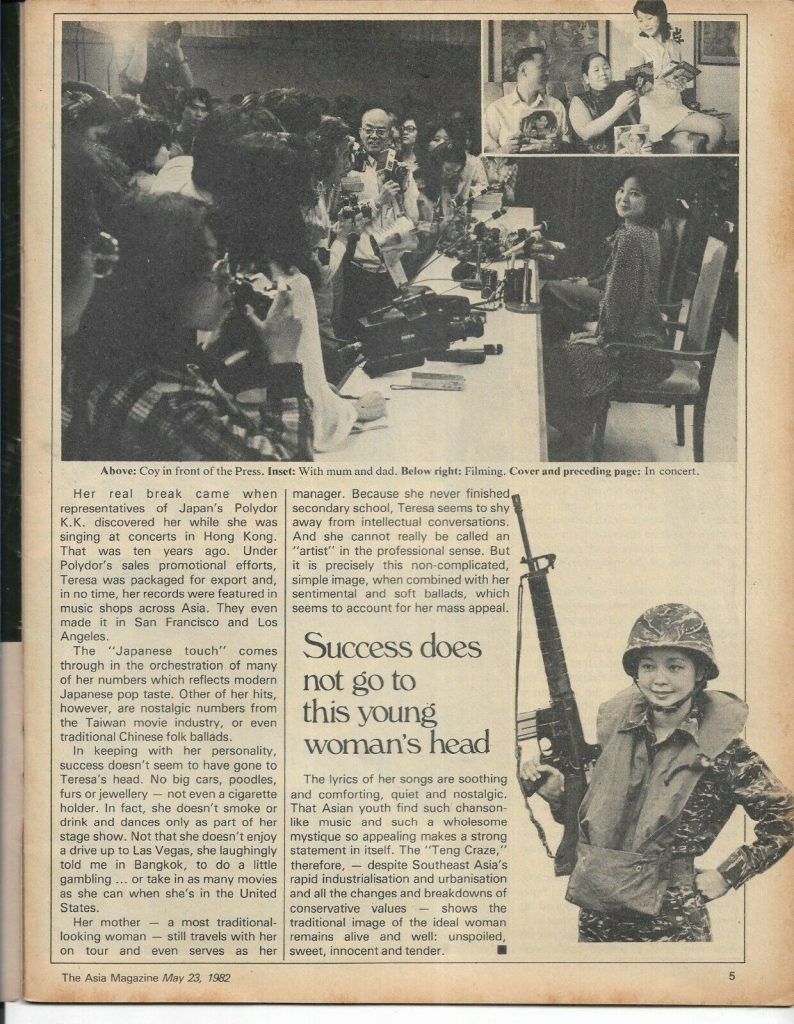The Teresa Teng craze/テレサ・テン熱
Above: Coy in front of the Press. Inset: With mum and dad.
Below right: Filming. Cover and preceding page: In concert.
Her real break came when representatives of Japan’s Polydor K.K. discovered her while she was singing at concerts in Hong Kong. That was ten years ago. Under Polydor’s sales promotional efforts, Teresa was packaged for export and, in no time, her records were featured in music shops across Asia. They even made it in San Francisco and Los Angeles.The “Japanese touch" comes through in the orchestration of many of her numbers which reflects modern Japanese pop taste. Other of her hits, however, are nostalgic numbers from the Taiwan movie industry, or even traditional Chinese folk ballads.
In keeping with her personality, success doesn’t seem to have gone to Teresa’s head. No big cars, poodles, furs or jewellery – not even a cigarette holder. In fact, she doesn’t smoke or drink and dances only as part of her stage show. Not that she doesn’t enjoy a drive up to Las Vegas, she laughingly told me in Bangkok, to do a little gambling … or take in as many movies as she can when she’s in the United States.
Her mother – a most traditional-looking woman – still travels with her on tour and even serves as hermanager. Because she never finished secondary school, Teresa seems to shy away from intellectual conversations. And she cannot really be called an “artist" in the professional sense. But it is precisely this non-complicated, simple image, when combined with her sentimental and soft ballads, which seems to account for her mass appeal.
Success does not go to this young woman’s head
The lyrics of her songs are soothing and comforting, quiet and nostalgic. That Asian youth find such chanson-like music and such a wholesome mystique so appealing makes a strong statement in itself. The “Teng Craze," therefore, – despite Southeast Asia’s rapid industrialisation and urbanisation and all the changes and breakdowns of conservative values – shows the traditional image of the ideal woman remains alive and well: unspoiled, sweet, innocent and tender. ■
The Asia Magazine May 23, 1982(p.5)
写真のキャプションに「表紙と前ページ」とあるので、文字の記事の前にさらに、コンサートの写真だけのページもあると思われます。
上の写真:記者たちの前で恥ずかしそうに はめ込みの写真:父母と一緒に
右下:撮影の様子 表紙と前ページ:コンサートにて本格的なブレイクのきっかけは、香港のコンサートで歌っていたところを日本のポリドール株式会社に見いだされたことだった。今から10年前のことである。ポリドールの販促活動により、テレサの(日本からの)海外用リリースも行われ、瞬く間にアジア各地の楽器店に並ぶようになった。サンフランシスコやロサンゼルスでも売れた。
彼女の曲の多くが現代日本のポップス・テイストを反映しており、そのオーケストレーションで、「日本らしさ」が伝わってくる。しかし、彼女のヒット曲の中には、台湾の映画界で生まれたノスタルジックなナンバーや、中国の伝統的な民謡のバラードもある。
彼女の人柄を反映して、彼女は成功によってうぬぼれを示すようなことはない。大きな車も、プードルも、毛皮も、宝石も、さらにはタバコ入れにさえも。実際のところ、タバコも吸わない、お酒も飲まない、ステージ以外ではダンスもやらない。「ラスベガスまで行ってギャンブルを楽しむこともあるのよ」と、バンコクで笑いながら教えてくれた。でも、アメリカにいるときは、できるだけたくさんの映画を見たという。
母親はたいへんに伝統的な女性で、今でも彼女のツアーに同行している、マネージャーだ。中学を卒業していないため、知的な会話は敬遠するようだ。また、専門的な意味での「アーティスト」とは言い難い。しかし、この単純明快なイメージと、センチメンタルでソフトなバラードこそが、彼女を大衆にアピールしているのだろう。
この若い女性は
成功でうぬぼれたりしない彼女の曲の歌詞は、心を癒し、安らぎを与え、静かでノスタルジックな雰囲気を醸し出している。アジアの若者たちが、シャンソンのような音楽と健全な神秘性に魅力を感じるということは、それだけで強い主張である。東南アジアの急速な工業化、都市化、保守的な価値観の変化や崩壊にもかかわらず、「テレサ・テン熱」は、伝統的な理想が健在であることを示しているのである。穢れがなく、甘く、無垢で、優しい、そんな女性像だ。■
「アジアマガジン」誌 1982年5月23日号 第5ページ



